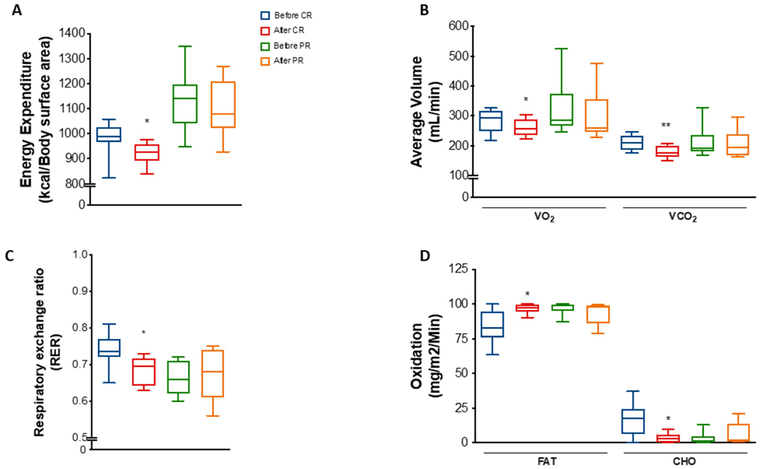moderate protein restriction can cure all ills
-
@Ecstatic_Hamster
Great study! Thanks for sharing.Here's an important part of the study:
Energy expenditure decreased in CR by about 6%, while it didn't in PR.
In CR, VO2 and VCO2 , respiratory quotient,
and carb oxidation decreased (-77%!) while it didn't decrease in PR.
That is all in line with what I saw in previous studies.
PR for the win.
-
I'm thinking about a modified version of protein restriction ATM.
If you'd have most of your protein at a certain point in time if the day , you'd get a big part of the MR/PR benefits.
In animals beneficial metabolic changes like an increase in FGF21 started showing after only 6h of the diet.
So if you eat a significant amount of protein only once a day, you get an 18h window of the benefits.I thinks that's a reason why (intermittent) fasting works to some degree: You're restricting protein.
-
For neophytes:
MS= Metabolic Syndrome
DR = Dietary restriction
CR = calorie restriction
PR = Protein restriction
isocaloric dietary protein => iso => what is required; according to RDA.Excerpt 1:
Protein restriction is sufficient to confer almost the same clinical outcomes as calorie restriction without the need for a reduction in calorie intake. The isocaloric characteristic of the PR intervention makes this approach a more attractive and less drastic dietary strategy in clinical settings and has more significant potential to be used as adjuvant therapy for people with metabolic syndrome.
Excerpt 2
More strikingly, both CR and PR improved insulin sensitivity by 62.3% and 93.2%, respectively, after treatment. Fecal microbiome diversity was not affected by the interventions.
Comment (LucH) :
It’s necessary to eat carbs at minima when ingesting meat. Not much. Otherwise you’ll get an insulin spike and the secretion of adrenaline and cortisol due to a lack of immediate fuel. Stressful and counterproductive. -
It’s necessary to eat carbs at minima when ingesting meat. Not much. Otherwise you’ll get an insulin spike and the secretion of adrenaline and cortisol due to a lack of immediate fuel. Stressful and counterproductive.
What? Are you saying if you eat more carbs with meat, you’ll lack immediate fuel? That it’s stressful and raises cortisol and adrenaline?
-
@LetTheRedeemed said in moderate protein restriction can cure all ills:
What? Are you saying if you eat more carbs with meat, you’ll lack immediate fuel?
No, WE need some carbs when eating meat. Not much required. A tomato or an orange IS fine. I Can show it with a graph if desired.
-
@LucH ok gotcha
-
@Mauritio I do exactly this. Large window of sugar-only from morning past noon (5:00AM-1:00PM) with nothing but honey, sugar, and some fruit. Then I excercise and 3-4 hour fast to allow last bit of blood sugar to be used up, then a big protein dinner around 5:00 or 6:00 PM. Its going great I totally recommend the intermittent protein restriction idea.
-
@Serotoninskeptic said in moderate protein restriction can cure all ills:
then a big protein dinner around 5:00 or 6:00 PM. Its going great I totally recommend the intermittent protein restriction idea.
You'd better take first a fruit or a tomato if you don't want to burn muscles.
A few carbs is required, not to secrete adrenaline and cortisol afterwards. -
The big issue with this is something that I noticed when I was doing the warrior diet.
You really can’t metabolize more than around 25 or 30 g of protein at a time.
So your protein may be too low if you’re doing only one protein meal.
And you’re loading yourself with a lot of protein at one time, which increases ammonia levels and stresses your kidneys.
-
great study! Thx for sharing.
-
@Ecstatic_Hamster pretty sure protein intake translation to increased muscle protein synthesis doesnt even begin topping out until 75-100g protein at one meal . irrespective of increased ammonia which maybe signals incomplete but not totally stopped protein utilization for better pathway